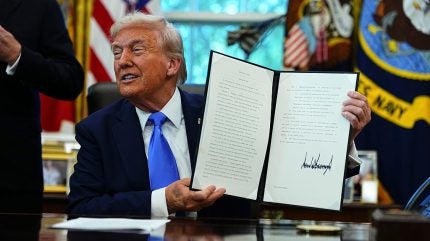
Following the US’ announcement that it will impose a $100,000 fee on the H-1B visa programme, other countries are reviewing their own policies to attract talented workers whose original intent was to go to the US.
This Wednesday, China will roll out the K Visa, which it announced in August. It is designed to attract young foreign graduates in science, technology, engineering and mathematics fields by allowing them to enter and live in China without an established job offer.

Discover B2B Marketing That Performs
Combine business intelligence and editorial excellence to reach engaged professionals across 36 leading media platforms.
The UK is considering reducing or slashing visa fees for “top global talent”, while Canadian Prime Minister Mark Carney has said his country is looking to form a “clear offering” for tech workers who would have previously tried to obtain an H-1B visa.
The H-1B visa programme functions through a lottery system with 85,000 annual slots. It is a skilled worker permit that has long been used to attract foreign talent to the US. Its beneficiaries have mostly been big tech companies, which dominate the programme’s top users. Amazon, for example, had 10,000 H-1B visas approved for its workers in the first half of 2025.
The use of these visas has been controversial among Trump’s supporters and across the political spectrum, as critics say companies use them to pay lower wages and undercut American salaries.
However, in an era where tech and AI skills are being highly sought after by CEOs, American or not, enacting a policy that narrows the talent pool could hurt US competitiveness. The policy also comes less than a month after the immigration raid at a Hyundai plant in Georgia, which raised concerns for companies employing foreign workers.

US Tariffs are shifting - will you react or anticipate?
Don’t let policy changes catch you off guard. Stay proactive with real-time data and expert analysis.
By GlobalData“The US business immigration system is in flux right now, with more potential changes to come,” says Sophie Alcorn, the founder of a law firm specialising in helping companies attain visas for foreign workers. She calls the fee announcement a “strong departure from the previous status quo”.
“Practitioners are awaiting more details on the National Interest Exception fee waiver process and who will be able to qualify. Additionally, a new proposed regulation last week is anticipated to change the annual H-1B lottery cycle prioritising higher-paid workers. Changes are expected to continue for the coming months,” she outlines.
It is another layer of uncertainty for foreign businesses in the US, which are already contending with higher costs from tariffs, changing regulations and political instability.
While the US hashes out the details of how the new H-1B visa fee will work, the welcoming message from competing economies to highly-skilled workers is clear.
“While President Trump announced late last week that it will make it harder to bring talent to the US, we want to make it easier to bring talent to the UK,” UK Chancellor of the Exchequer Rachel Reeves said last week at the opening of British start-up Revolut’s new headquarters in London.





